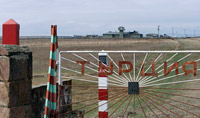This issue gives both Armenians and Turks a very hard time. Yesterday the Turkish Radical daily newspaper adverted to its negative effects for Armenia.
The economic journalist of Armenian descent Aram Ekin Duran, who has recently visited Armenia, observed the matter in the context of whether the opening of the border is useful for the major businessmen of Armenia. Having spoken with experts, businessmen and journalists of Armenia, Duran came to the conclusion that Armenia is in the claws of oligarchs and the latter control the exportation and importation of Armenia by having close ties with the government of Armenia. “The fact of the closed border with the neighboring country Armenia is very useful for the domestic oligarchs of Armenia, who have full control of the market after the collapse of the Soviet Union. The approximately 40 oligarchs monopolized the imports from Turkey, gaining billions of dollars as a result of their close relationship with the government and the bureaucracy. Among these oligarchs there are NA MPs, who do not allow the development of small and medium businesses,” writes Aram Ekin Duran and adds that the opening of the Turkish-Armenian birder contradicts the interests of the Armenian oligarchs. The journalist also quoted the words of businessman Krist Pilosyan, who claims that certain companies are critically against the opening of the border. The reason is simple, “EU standards of Turkish goods in our market cannot compete with the interior." In fact, the anxiety of the competition after the breakup of the Soviet Union behind the emerging oligarchic system has a big impact. In business, government and using their influence in the bureaucracy, including the Russian territory of the former Soviet countries, billions of dollars of wealth who established oligarchs, the major problem for the economy of Armenia.” Of course, it is no secret for anyone that the economy of Armenia is oligarchic. But no professional expertise was conducted to assess the effect of the border. Only a more or less professional survey was conducted by AEPLAC several years ago. The experts of AEPLAC came to the conclusion that the opening of the Armenian-Turkish border cannot have an essential meaning for the growth of the Armenian economy. Specifically, according to the then chair of the center Tigran Jrbashyan during one year Armenia’s GDP would only grow by 0,67%, exportation – 5,23% and during 5 years the numbers would grow 2,7% and 17,7% respectively. Back in the day, many of our economists were not very serious about this research and they thought of it as an internal order. The late economist Edward Aghajanov also thought that there would be competition in Armenia after the opening of the border, which will conflict the interests of the oligarchs. “It is no vain that there are certain calculations, according to which the opening of the border may cause only little improvement. I think they have ordered this survey. In the event of the importation of the Turkish good the oligarchs will be deprived from their monopolies. And the consequence of that would be that first of all the people would benefit from that. The prices will go down. If we are afraid of Turkish goods then how are we going to compete with the goods of European states? If we think that the Turkish market is not so developed then how can we deal with the European market? I am sure that this protectionism is being initiated by the oligarchs so that they continue receive super incomes,” said the economist. 5 years have already passed since these words were uttered but judging from the current moods we may assume that not much has changed. The fear still exists. Let us note that the reasons of fear may be found both in official statistics and the real life. For example, during the first 5 months of this year our trade turnout with Turkey exceeded 80 million USD, which makes almost 4% of Armenia’s foreign trade. In the conditions of closed borders this is not a bad index. But what we should be afraid of is that in the light of 80 million turnout exportation amounts to only 512 thousand USD. It means we have an extremely negative trade balance with Turkey. Moreover, the volumes of importation from Turkey are higher than what they show because the goods reach Armenia through Georgia via cargo forwarding companies or other means. It is also very hard to say what concretely they import from Turkey. However, judging from the Armenian market we may say that everything is being imported – food, clothes, electric devices. It is hard to imagine any good in our market, which wouldn’t have its Turkish duplicate. Moreover, the Turkish version costs cheaper and has a better quality than the Chinese goods. This indeed shakes our oligarchs. It means that not only the importer oligarchs are concerned about the opening of the border but also the domestic producers and certain experts. But the problem is that Armenia doesn’t have a broad specter production. The overwhelming part of the domestic production includes food, which will definitely be able to withstand the domestic competition and secondly Armenia has a mining industry, which is out of competition. In fact, the Turkish goods will compete with goods imported from other countries and we can benefit from that not to mention the cut of transportation costs, possible investments, etc. And the fact that we are afraid of competition (especially of the one of the unfriendly state) means that we confess our own weakness.

